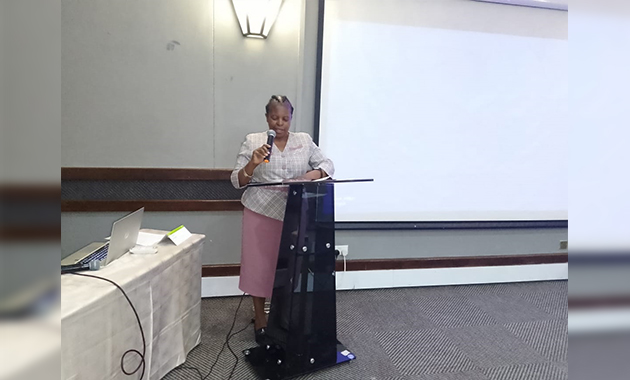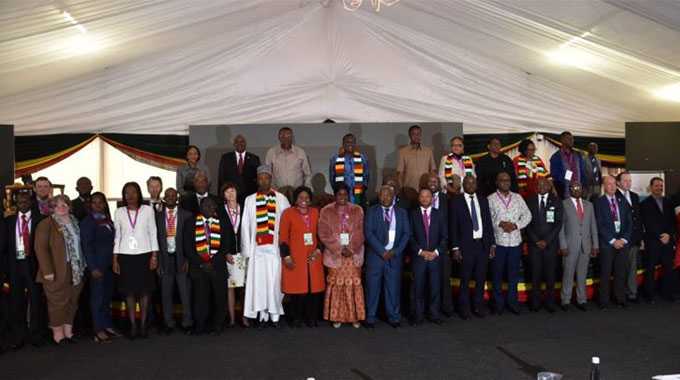It’s now pay first, or no discharge

sleeping on one of the four beds in a tiny room at Harare Central Hospital on a Saturday afternoon.
Its mother, Evis, still recovering from labour pains, sits on a wooden bench on the side of a bed in the small room.
Five other new mothers also sit on benches in the same room whose windows have the thinnest of burglar bars.
Evis gave birth at 6am and was examined by a doctor who certified her and the baby fit and discharged them at 1pm.
While Evis hoped to go home and rest, she was told that she would not leave the hospital until her bill of US$124 or part of the money had been paid.
She had no money and as such, one of the nurses took her suitcase with all the baby’s clothes, and wrote Evis’ name on it. The nurse took suitcases other new mothers and gave her an old blanket and cloth to cover the baby and pulled the suitcase to another room in the maternity ward leaving Evis and her baby in the room.
“They told me that we would not leave the hospital until the bill has been settled. I was initially registered at Sunningdale 2 Polyclinic and was supposed to give birth at Edith Opperman Clinic in Mbare.
“During my prenatal visits to the clinic, the nurses suspected that I could face problems during delivery and I was referred to Harare Central Hospital.
“I would come here and they said the baby was now facing downwards. When I felt labour pains, I went to Edith Opperman and they told me that even if Harare Central Hospital had confirmed that my baby was now facing downwards, I still had to go and give birth at the hospital,” she said.
At the hospital, Evis had a normal delivery and was excited to see her bundle of joy for the first time. But the joy was temporary.
She was to be “kidnapped” and held “prisoner” in the hospital until someone could bail her out.
To make matters worse, her husband was out of town.
Kidnapping is generally defined as the abduction of another person with intent to hold him or her to ransom or reward; or use him or her as a shield or hostage; or accomplish or aid the commission of any felony or flight there from; or inflict physical injury upon him, or to violate or abuse him sexually among others.
“The nurse who took the suitcase returned and told me to carry my baby to another room in the maternity ward. I told them I could not carry the baby because I was in pain.
“The nurse took the baby but this was after lecturing to me that it would not be her fault if the baby fell. I told her that I did not expect that from her since she is trained to do that,” said the tearful young mother.
In the room, Evis and the other five women sit and just hope that someone will rescue them from the discomfort.
“We were told not to sleep on the beds as they are meant for babies. If anything, the beds were not adequate for all of us,” she said.
One of the women in the small “holding cell” has been there for three days. She is mentally-ill and has been treated for free. Her case is understandable as she is still there because no one is forthcoming to take her home.
She just sits and watches time pass by.
Later in the day, a voice informing the women to collect their lunch from outside the room is heard. Those who can properly walk go and collect sadza and cabbage.
The other mothers also bring for the few who cannot walk. At 3pm, the first mother and baby leave the “holding room” after US$50 has been paid.
Two others leave a few hours later while more who have not paid their hospital fees come into the “prison”.
Evis’ aunt finally arrives at the hospital at 4pm and deposits US$60.
They are given the bag with the baby’s clothes, fina-lly dress her up and leave.
However, the hospital withholds the baby’s birth record and Evis will only get it once they pay off the balance. Evis is one of the hundreds of mothers and babies who are “detained” for failing to pay hospital fees at Harare Central Hospital.
While this detention has become normal for some mothers, it raises a lot of questions. Is it lawful?
Is this not infringing the human rights of both mother and child? The country’s laws clearly state that only police, a magistrate and health authorities can detain a person, out of reasonable grounds in terms of public order and security and it is difficult to see how the hospital justifies its actions.
Deputy Minister of Health and Child Welfare Dr Douglas Mombeshora said what the hospital is doing is unacceptable.
“We have not heard of such a report but our policy clearly says that no one should be detained for not having money.
“If a patient does not have money, the hospital should discharge her and make follow ups if no payment is made. Even the birth record should not be withheld by the hospital,” said Dr Mombeshora.
He said if people come across such an experience, they should report to his ministry.
Harare Central Hospital acting chief executive Mr George Vera said detaining mothers is not his hospital’s policy.
“We discourage such a practice. To be quite honest a lot of people have been treated for free at this hospital and I am not aware of what is happening to the new mothers.
“This story has been written before in the media, even by your own paper and I am surprised that mothers are still being detained. This needs investigation as it is against the regulations of the hospital,” he said.
Police chief spokesperson, Senior Assistant Commissioner, Wayne Bvudzijena said detaining mothers and their babies was illegal as far as the laws of the country were concerned.
“People are detained on reasonable suspicion of having committed an offence and there is a possibility that they might run away. In this case, not having money to pay hospital fees is not an offence. This is not legal as far as I am concerned,” said the police spokesperson.
Zimbabwe Lawyers for Human Rights, project manager for human rights defenders, Ms Rose Hanzi, said it was unlawful and an infringement of human rights for a Government institution like Harare Central Hospital to detain mothers and their babies for the non payment of hospital fees.
“Hospitals should pursue a claim for their money through the courts if no payment is made. We are not encouraging State hospitals to claim the money from the non paying mothers but are encouraging them to uphold their obligation of ensuring that mothers are able top access maternal health services at a reasonable cost.
“In fact all women should be receiving maternal services because we believe the Government is supposed to put more money in health to ensure that maternal health benefits,” she said. The human rights lawyer added that under Zimbabwean law only the police can detain someone when there is reasonable suspicion that they have committed an offence.
“In this case, detaining mothers for non payment of hospital fees for whatever period of time is illegal. What the hospital is doing is simply putting the mother under duress to pay money that she does not have.”
The practice, which presents a strong case for the reduction of maternity fees, also flies in the face of efforts to improve maternal and infant health.
Improving maternal health, is one of the eight Millennium Development Goals aimed at achieving universal access to reproductive health by 2015.
According to the Zimbabwe MDG status report major challenges of achieving MDG 5 include a health system mechanism that is not pro poor as user fees remain a significant barrier to reproductive health. But with such things happening at a public institution like Harare Central Hospital the country may fall short in achieving this goal.
The report further says the deteriorating capacity of and responsiveness of the healthcare system, which has seen 80 percent of midwifery posts in the public sector vacant is another problem affecting MDG 5.
“It is unlikely that Zimbabwe will meet the maternal mortality rate (MMR) target by 2015 as the capacity of the healthcare system has deteriorated significantly and the MMR increased. If there is to be real progress in this regard, more efforts and investments are required to strengthen the health care system and scale up coverage of maternity waiting homes, including adopting and implementing a pro-poor, predictable and enhanced health-financing policies and mechanisms,” the report further states.
With such a policy at a public hospital, will women who cannot afford to pay maternity fees access these health facilities when they are “imprisoned” for non payment?
If anything, giving birth is a national duty.
[email protected]






Comments